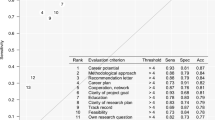Abstract
The effect of rating format and non-performance variables on rating leniency were studied in two law enforcement organizations. One of these variables, trust in the appraisal process, was defined as the extent to which a rater believes that fair and accurate appraisal will be made in the organization. A measure of trust in appraisal accounted for a significant proportion of variance in performance ratings. The purpose of appraisal (i.e., feedback or promotion) also accounted for rating variance. A mixed-standard rating format showed less susceptibility to the non-performance variables on the extent of leniency. Discussion centers on the usefulness of rater and organizational variables in performance appraisal research.
Similar content being viewed by others
References
Bernardin, H.J., and Kane J., (in press)Performance appraisal: A contingency approach to system development and evaluation. Boston, MA: PWS-Kent.
Bernardin, H.J. and Cascio, W.F. (1988) Performance appraisal and the law. In R. Schuler and S. Youngblood (Eds.)Readings in Personnel/Human Resources, 248–252. St. Paul: West Publishing.
Bernardin, H.J., Abbott, J.R. and Cooper, D. (1985) The effects of appraisal purpose on rating effectiveness. Paper presented at annual meeting of the Academy of Management.
Bernardin, H.J. and Beatty, R.W. (1984)Performance Appraisal: Assessing Human Behavior at Work. Boston: Kent-Wadsworth Publishing.
Bernardin, H.J., Cardy, R.L. and Carlyle, J. (1982) Cognitive complexity and appraisal effectiveness: It makes no never mind.Journal of Applied Psychology, 67, 151–160.
Bernardin, H.J., Orban, L. and Carlyle, J. (1981) A critical assessment of mixed standard rating scales.Proceedings of the Academy of Management, 308–312.
Bernardin, H.J. and Villanova P.J. (1986) Performance appraisal. In E. Locke (Ed.)Generalizing from Laboratory to Field Settings. Lexington, MA: D.C. Heath.
Blanz, F. and Ghiselli, E.E. (1972) The mixed standard scale: A new rating system.Personnel Psychology 25, 185–199.
Cohen, J. (1978) Partialed products are interactions; partialed powers are curve components.Psychological Bulletin, 85, 858–866.
Cook, T.D. and Campbell, D.T. (1979)Quasi-experimentation. Chicago: Rand-McNally.
Fusilier, M.R. (1980) The effects of anonymity and outcome contingencies on rater beliefs and behavior in a performance appraisal situation.Proceedings of the Academy of Management, 273–277.
Hyde, A.C. (1982) Performance appraisal in the post-reform era.Public Personnel Management, 11, 294–305.
Kavanagh, M.J., Kavanagh, B.B., Lee, T. and Hedge, J. (1988)The effects of the purpose of measurement, acquaintance with the job, and research method on performance measurement rating accuracy. Paper presented at the annual meeting of the Academy of Management, Anaheim, CA.
Klores, M.S. (1966) Rater bias in forced-distribution ratings.Personnel Psychology, 19, 411–421.
Landy, F.J. and Farr, J. (1980) Performance rating.Psychological Bulletin, 87, 72–107.
Leitner, L.M., Landfield, A.W. and Barr, M.A.Cognitive complexity: A review and elaboration within personal construct theory. Unpublished manuscript, the University of Kansas, 1975.
Longnecker, C.O., Gioia, D.A., and Sims, H.P. (1987) Behind the mask: The politics of employee appraisal.Academy of Management Executive, 1, 183–194.
McIntyre, R.M., Smith, D.E. and Hassett, C.D. (1983) Accuracy of performance rating as affected by rater training and perceived purpose of rating.Journal and Applied Psychology, 69, 147–156.
Mohrman, A.M., Resnick-West, S.M. & Lawler, E. (1989)Designing performance appraisal systems. San Francisco: Jossey-Bass.
Murphy, K.R., Balzer, W., Kellam, K. and Armstrong, J. (1984). Effects of the purpose of rating and accuracy in observing behavior and evaluating teaching performance.Journal of Educational Psychology, 76, 45–54.
Reilly, C.E. and Balzer, W.K. (1989).Effect of purpose on observation and evaluation of teaching performance. Unpublished manuscript. Dept. of Psychology, Bowling Green State University.
Schneier, C.E. (1977) Operational utility and psychometric characteristics of behavioral expectation scales: A cognitive reinterpretation.Journal of Applied Psychology, 62, 541–548.
Smith, D.E., Hassett, C.E. and McIntyre, R.M. (1982)Using student ratings for administrative decisions: Are ratings contaminated by perceived uses of the information. Paper presented at the 23rd Annual Meeting of the Western Academy of Management, Colorado Springs, CO.
Smith, P.C. and Kendall, L.M. (1963) Retranslation of expectations: An approach to the construction of unambiguous anchors for rating scales.Journal of Applied Psychology, 47, 149–155.
Stogdill, R.M. (1963)Manual for the Leadership Behavior Description Questionnaire: Form XII. Columbus: Ohio State University, Bureau of Business Research.
Thompson, F.J. (1982) Performance appraisal of public managers: Inspiration, consensual tests and the margins.Public Personnel Management, 11, 306–313.
U.S. Merit Systems Protection Board (1989)U.S. Office of personnel management and the merit system: A retrospective system. U.S. Merit Systems Protection Board. Washington, D.C., June.
Zedeck, S. and Cascio, W. (1982) Performance appraisal decisions as a function of rater training and purpose of the appraisal.Journal of Applied Psychology, 67, 752–758.
Author information
Authors and Affiliations
Rights and permissions
About this article
Cite this article
Bernardin, H.J., Orban, J.A. Leniency effect as a function of rating format, purpose for appraisal, and rater individual differences. J Bus Psychol 5, 197–211 (1990). https://doi.org/10.1007/BF01014332
Issue Date:
DOI: https://doi.org/10.1007/BF01014332



